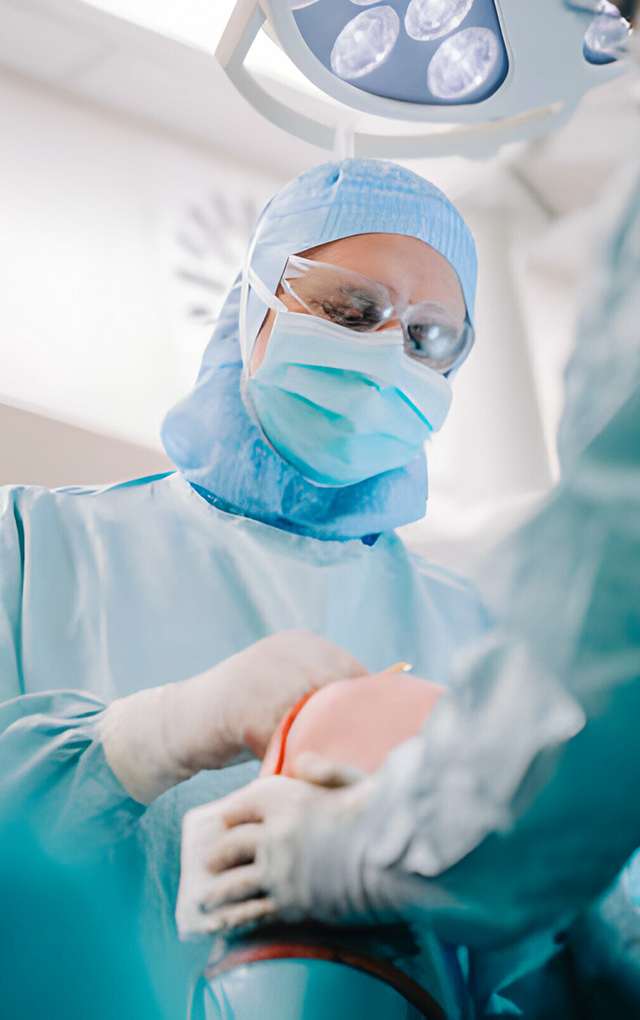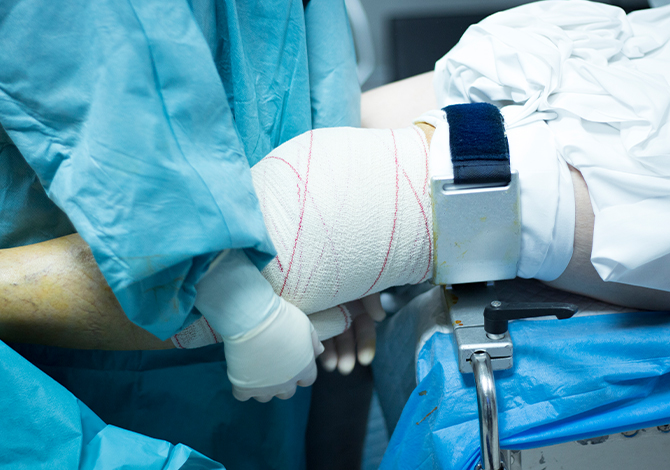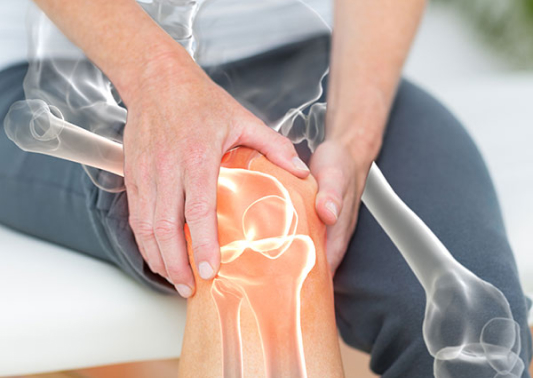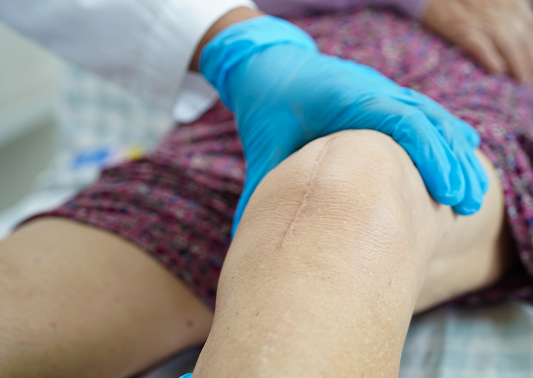Non-Surgical Knee Pain and Arthritis Specialists in Fairfax, DE
Our knees are incredible structures that withstand a lot of pressure and strain from everyday activities like running, jumping, and walking. Unfortunately, inflammation and injury can happen if we overwork or misuse these joints. Even with the best care, osteoarthritis can develop, causing knee pain. While some people turn to surgery or medication for quick relief, this approach can be counterproductive. Have you ever thought about how painful and long recovery can be when you undergo a knee replacement?
At Kennedy Health, we believe there are better options for solving your knee pain - not temporarily, but for years to come. Unlike other providers, our knee pain and arthritis specialists in Fairfax, DE, focus on finding and solving the root cause of your knee pain. That way, we can provide more comprehensive and long-lasting relief to our patients.
Regenerative medicine for knee pain is both a safe and effective option to consider, especially if you're wary about the pitfalls of knee replacement surgery or powerful pain medications. What types of knee pain and conditions can regenerative medicine from Kennedy Health solve? Our range of cutting-edge treatments can address a number of musculoskeletal issues, including:
- ACL Tears
- MCL Tears
- Arthritis
- Tendonitis
- Ligament Inflammation
- Tendon Inflammation
- Knee Tears
- More
If you have been searching high and low for a knee pain clinic offering natural healing, tissue regeneration, and improved quality of life, our knee pain specialists are here to help.
Service Areas
The Knee Pain and
Arthritis Specialists in Fairfax, DE You Can Trust
As we age, the wear and tear on our muscles and joints can cause discomfort and pain. While it's true that some people believe that these aches and pains are an inevitable part of aging, many knee pain doctors challenge this assumption. At Kennedy Health, our team of arthritis and knee pain specialists aims to provide natural therapies that activate your body's innate ability to heal and renew its tissues. Rather than relying on harmful surgeries and sketchy pain medicines, we're laser-focused on harnessing this remarkable power so that you have a viable alternative to going under the knife.

While surgery may be necessary in some cases, it's essential to recognize that it's not always the best solution for every type of pain. Our non-surgical knee pain treatments have proven to be highly effective in resolving discomfort and restoring mobility for many of our patients. During your consultation with us, our experienced team will evaluate your current condition and needs with sensitivity and care.

We understand the impact that pain can have on your life and are committed to providing the most effective and appropriate knee pain treatment for your unique situation. If surgery is the best option for you, we will offer our professional advice and guidance to help you make an informed decision. However, if our regenerative knee pain therapy is a viable alternative, we will take the time to discuss your options in detail and work with you to design a personalized treatment plan that meets your specific needs.


Is Knee Replacement Surgery Your Best Option?
Picture this: After trying medication and cortisone injections to no avail, your physician has suggested surgery as the only remaining option for your excruciating knee pain. Though surgery is a daunting prospect due to the potential risks and lengthy recovery time, you trust that your doctor has your best interests at heart.
But is a knee replacement really the best choice for long-lasting relief from pain? At Kennedy Health, our knee pain and arthritis specialists in Fairfax, DE believe there's a better way.
How Does Regenerative Medicine Help Chronic Knee Pain?
The natural ability of the human body to heal itself is truly remarkable. From repairing broken bones to sealing cuts and fighting off infections, the body is equipped with powerful healing mechanisms. But in cases of severe injury or illness, regenerative medicine may provide a viable solution. By utilizing cutting-edge techniques such as cell therapy, bioengineering, and gene therapy, regenerative medicine aims to enhance the body's own healing capabilities.
Regenerative therapies are seen as the future of medicine, representing a shift away from traditional medical interventions. They hold tremendous promise for treating chronic conditions like osteoarthritis, as well as more serious diseases such as diabetes, cancer, and Parkinson's. As the field of regenerative medicine continues to evolve, new treatments are constantly emerging, rendering older methods obsolete.
For instance, microfracture procedures, which were once used to treat cartilage defects leading to arthritis, are no longer favored in the US. Instead, knee pain and arthritis specialists in Fairfax, DE prefer regenerative knee pain treatments like platelet-rich plasma therapy, which has proven to be highly effective for chronic knee pain sufferers.
Can Regenerative Medicine Really Help You Avoid Knee Replacement Surgery?
At Kennedy Health, we receive inquiries almost every day from folks just like you who have been fighting through chronic knee pain. They come to us excited about - yet still unsure of - regenerative medicine for their knees. They wonder whether or not these treatments are truly effective. Fortunately, by providing them with a custom recovery plan tailored to their body, we can show them it works, not just tell them.
As a popular new form of treatment, many studies have been conducted into the efficacy of treatments such as PRP, prolotherapy, extracorporeal shockwave therapy, and more. In fact, regenerative medical therapies are actively being pursued by renowned institutions like Harvard and the Mayo Clinic. The NIH recognizes that regenerative medicine is a highly promising treatment option for addressing knee pain and other diseases.
Additionally, the FDA maintains high efficacy and safety standards by overseeing various regenerative medicines, while organizations such as the AATB focus on ethical considerations in the advancement of regenerative medical therapies.
If you've been looking everywhere for a knee pain relief clinic but keep failing to find a solution tailored to your body, regenerative therapy may be the answer. Our patients report real relief from knee pain without suffering through issues common to knee replacements, such as:
- Unneeded Complications
- Long and Painful Recovery Times
- Prescription Pain Pills
- Anesthesia
- Unnecessary Scar Tissue and Knee Scarring
- Expensive and Ineffective Surgery

Who Benefits Most from Knee Pain and Arthritis Specialists in Fairfax, DE?
Regenerative medicines have been proven to help men and women with a wide range of common issues, from skin care needs to injury healing. When it comes to knee pain, regenerative therapies are becoming the go-to choice over knee replacements. If you're experiencing one or more of the following conditions, it may be time to see a knee pain and arthritis specialist from Kennedy Health.


Knee Arthritis
Osteoarthritis, rheumatoid arthritis, and post-traumatic arthritis can lead to knee pain, stiffness, and inflammation due to cartilage degeneration or autoimmune responses. In terms of common knee problems, arthritis is near the top of the list and can often be treated without needing a knee replacement or surgery.

Repetitive Stress and Overuse
Repetitive movements or prolonged stress on the knee joint, such as running or jumping, can lead to chronic knee pain caused by conditions like patellofemoral pain syndrome or iliotibial band syndrome.

Tendonitis
Inflammation of tendons, such as patellar or quadriceps tendonitis, can cause knee pain and difficulty with movement.

Trauma and Injuries
Knee injuries, including ligament tears (ACL, MCL, or meniscus), fractures, dislocations, or strains, can cause acute pain and instability in the knee.

Torn Ligaments
Damage to the ACL, MCL, or other knee ligaments can lead to instability in the knee joint, discomfort, and challenges with weight-bearing tasks.
3 Reasons to Re-Think a Knee Replacement Surgery
If your doctor is saying that a knee replacement is the only option available to eliminate your knee pain, consider it a red flag. Before you go under the knife, consider these potential pitfalls:
Knee ReplacementSurgery Alternatives from Kennedy Health
Do you often experience joint pain that interferes with your daily activities and causes discomfort? Joint pain - especially in your knees - can be particularly debilitating, making it difficult to stand, sit, squat, or enjoy time with loved ones. While sports injuries often result in knee pain, most chronic issues stem from the gradual deterioration of tissue that supports your joints.
For example, the cartilage in your knee, which cushions your joints, can break down, causing bones to rub together, which leads to arthritis. Thankfully, non-surgical medical treatments for knee pain and arthritis have come a long way in the last two decades. At Kennedy Health, we offer a variety of regenerative alternatives to knee surgery that can provide long-term relief from tissue breakdown in your knees.
Here are just a few of the most popular treatment options provided by our knee pain and arthritis specialists in Fairfax, DE.
Platelet-Rich Plasma Therapy for Knee Pain
PRP, which stands for platelet-rich plasma, is a special type of blood plasma that contains a higher concentration of platelets than usual. Platelets are blood cells that aid in the growth and healing of the body. For people experiencing knee joint pain, PRP injections may be beneficial in reducing inflammation and promoting healing.
First, one of our specialists extracts a small amount of blood from your body. That blood is placed in a centrifuge. The centrifuge then spins the blood, causing your platelets to separate from the red blood cells. This platelet-rich plasma is then injected into your knee. With time, your body's own healing mechanisms provide joint pain relief, which can help you avoid surgery.

Extracorporeal Shockwave Therapy for Knee Pain
Shockwave therapy involves delivering high-energy sound waves to the affected areas of your knees, which can help stimulate healing, pain reduction, and tissue regeneration. Shockwave therapy can also be very helpful when it comes to restoring your overall knee functionality because it breaks down scar tissue and stimulates blood vessel growth, both of which are crucial for long-lasting relief.

Laser Therapy for Knee Pain
Most folks don't think about lasers when it comes to treating their chronic knee pain. But in modern times, truth is often stranger than fiction. Unlike high-level laser treatment, laser therapy for knee pain directs light energy to the affected area without causing any damage to the skin. By sending a 30-second light pulse into the knee, the light energy effectively penetrates deep into the joint and triggers chemical changes that promote the healing and growth of damaged cells and tissues. Contact Kennedy Health today for more information on this remarkable regenerative treatment.

Prolotherapy for Knee Pain
Regenerative injection therapy, or prolotherapy, is a medical procedure that aims to trigger your body's natural healing process by injecting a solution into the affected area of your knees. This exciting technique can help to strengthen your tendons, ligaments, and joints, which ultimately lessens your pain and improves your stability.

True Relief from Knee Pain Begins with Custom Treatment from Kennedy Health
Are you sick and tired of your knees holding you back from enjoying life to its fullest? Few things are as heartbreaking as not being able to enjoy activities with your kids, grandkids, and loved ones. If you're suffering from knee pain due to an injury, arthritis, or another condition, don't settle for a lifetime of pain or harmful surgery. Fight back with regenerative medicine from Kennedy Health.
Our knee pain and arthritis specialists in Fairfax, DE will conduct a thorough evaluation of your knees, including a review of your medical history and diagnostic tests to determine the best treatment for your specific type of pain.
Unlike some clinics, our team prioritizes personalized care and works closely with you to develop a comprehensive approach to managing your symptoms. It all starts by scheduling a consultation at our office. If you're ready to reclaim your active lifestyle, we're here to support you every step of the way.
Latest News in Fairfax, DE
Bassist Christian de Mesones returns to The Birchmere
Keith Loria / Special to the Fairfax County Timeshttps://www.fairfaxtimes.com/arts_entertainment/bassist-christian-de-mesones-returns-to-the-birchmere/article_43fdf476-d949-11ed-b725-eb8e2407c122.html
The musician is well-known in the regionDMV bassist, composer, and band leader Christian de Mesones has been playing music for more than 40 years. Around the area, he has regularly performed at The Carlyle Club in Alexandria; Bethesda Blues & Jazz, and has sold out multiple shows at the legendary Blues Alley Supper Club in the District.He remembers vividly seeing his first concert—the legendary Kiss—and that ignited his love of the bass.“I grew up in a household that was rich with m...
The musician is well-known in the region
DMV bassist, composer, and band leader Christian de Mesones has been playing music for more than 40 years. Around the area, he has regularly performed at The Carlyle Club in Alexandria; Bethesda Blues & Jazz, and has sold out multiple shows at the legendary Blues Alley Supper Club in the District.
He remembers vividly seeing his first concert—the legendary Kiss—and that ignited his love of the bass.
“I grew up in a household that was rich with music and I heard everything from Broadway plays to Stravinsky to classic rock and jazz, but this was the first time I felt I could relate to the bass because of Gene Simmons,” de Mesones said. “I immediately changed my direction in life after that concert.”
He played with numerous bands in high school and then got really serious, graduating from the Bass Institute of Technology in Hollywood. Since then, he’s been part of bands in New York, Hollywood, Virginia, and Washington, D.C.
“I pursued a career in heavy metal and hard rock, and one of my first gigs after school was playing for a cover band in Hawaii,” de Mesones said. “Then I came to D.C., and started all over again.”
It was then that he switched gears and started playing more Latin jazz and R&B, and has been pushing hard ever since.
“I released single after single through an independent distributor and I started slowly building a career,” de Mesones said.
After recording with different groups throughout most of his career, a month before the pandemic, de Mesones released his debut solo album, “They Call Me Big New York.”
The album, an impassioned collection of Latin, funk, soul, and rhythm & blues, features 25 national recording artists and has resulted in multiple Top-10 singles and more than 2 million streams on Spotify. The song “Big Tall Wish” was featured on the Dave Koz Lounge show on Watercolors Sirius XM and reached No. 6 on the Groove Jazz/RadioWave chart.
“It came out in January and did great,” de Mesones said.
His biggest single to date, “Hispanica,” features legendary pianist Bob James, and reached No. 1 on Billboard’s Smooth Jazz Airplay chart.
“This is a song I really believe in but originally it was done with a vocalist,” de Mesones said. “It didn’t catch any fire at first, so I released it as an instrumental with Bob James—one of the biggest names in contemporary jazz—and it really took off. He is so respected and he blessed me by playing on this song. That opened a lot of doors for me.”
He performed songs off the album for one of the first times at The Birchmere last March, and is returning to the venue on April 14 for a new show he calls, “You Only Live Twice.”
“This is going to be a brand-new show for me with a theme,” de Mesones said. “I’m going to be playing not only songs off my debut album, but I’ll be doing new tracks off my upcoming album, which I hope to have a soft release in time for the show.”
That record, “You Only Live Twice,” has a theme in line with “The Man Who Fell to Earth,” with a man who comes from another world finding the planet through the pulse of the music.
“It’s futuristic, but each song has some kind of meaning,” de Mesones said. “I’m putting the show together now and I’ll have visuals behind all of my songs.”
When he played The Birchmere last year, he used visuals for the first time on stage, and called the experience “spectacular.”
“It made me want to do it all the time, but it’s hard because you don’t get a budget to do that most places, but The Birchmere provides it for me, which is awesome,” de Mesones said. “It’s going to be pretty cool visually.”
He hopes to see a packed house at The Birchmere gig and promises it will be an exciting time.
“It will have a lot of instrumentation, but it’s not a one-dimensional thing; if you love horns, you’re going to get three of the best in the area,” de Mesones said. “We’re also going to do a song in honor of Gary Oelze, who made The Birchmere the best place to be.”
AstraZeneca sells off Fairfax campus for $50 million
Scott Gosshttps://www.delawareonline.com/story/money/real-estate/2017/07/06/astrazeneca-sells-off-fairfax-campus-55-m/454706001/
AstraZeneca sold its U.S. headquarters in Fairfax to Delle Donne & Associates in a deal valued at $50 million, but company officials insist the pharmaceutical giant is not going anywhere.On the same day it closed on the sale, the pharmaceutical giant signed a long-term lease agreement for two buildings on the 80-acre campus it has occupied for nearly two decades."AstraZeneca remains committed to the state of Delaware," spokeswoman Alexandra Engel said. "Selling the site and leasing back a small...
AstraZeneca sold its U.S. headquarters in Fairfax to Delle Donne & Associates in a deal valued at $50 million, but company officials insist the pharmaceutical giant is not going anywhere.
On the same day it closed on the sale, the pharmaceutical giant signed a long-term lease agreement for two buildings on the 80-acre campus it has occupied for nearly two decades.
"AstraZeneca remains committed to the state of Delaware," spokeswoman Alexandra Engel said. "Selling the site and leasing back a smaller footprint will allow us to more efficiently use our office space while lowering ongoing operational costs."
RELATED:AstraZeneca's bladder cancer drug could generate $6.5B
RELATED:JPMorgan Chase celebrates Delaware at annual meeting
The drugmaker, which recorded $23 billion in revenue last year, declined to disclose terms of the lease it signed with Delle Donne, the development company owned by the family of WNBA star Elena Delle Donne.
Ernie Delle Donne, president and chief executive officer of the Stanton-based company, said AstraZeneca signed on for enough years to make him "extremely comfortable."
"Having AstraZeneca remain in place was extremely important to our future plans for the property," he said. "Them, along with JPMorgan, Nemours and DuPont's Experimental Station all being nearby will be a major selling point as we begin to market the site to future tenants."
The sale and leaseback contract was finalized on June 30, but only became public this week. The deal completes a plan AstraZenca first revealed last summer when it put the property on the market.
"It's definitely a fair price," said John Kaczowka, senior vice president at the brokerage firm CBRE. "It's a great location that's just outside the city and accessible from two major roadways. I think [Delle Donne] will be very successful with that property."
The drugmaker says it now plans to consolidate its operations into the two office buildings closest to Concord Pike (U.S. 202), known as the Alapocas and Brandywine buildings. AstraZeneca said it will spend an undisclosed sum to renovate those structures, which collectively total about 380,000 square feet.
Once that move is complete sometime around late 2018, Delle Donne will invest another $50 million to renovate the other two buildings on the site, known as FOC and FOP. Those buildings collectively total about 500,000 square feet of office space.
The campus is approved for another 900,000 square feet of development, and Delle Donne said his company is weighing the best use for that land.
"We're contemplating a mixed use that could involve housing, retail, office space and possibly even a hotel," he said.
Delle Donne & Associates is developing a similar mixed-use project on 16 acres of the University's of Delaware's Science, Technology and Advanced Research Campus off South College Avenue in Newark – the former site of a Chrysler Assembly plant.
The developer said he sees the AstraZeneca site as the second piece of major redevelopment projects in opposite ends of New Castle County. Delle Donne & Associates also paid $55 million to purchase the 450,000-square-foot Christiana Executive Campus near the Christiana Mall in late 2016.
"A location with this kind of geography, physical plant and incredible infrastructure doesn't come around very often, at least not in my lifetime," he said of the AstraZeneca site. "This is really something special."
AstraZeneca built its North American headquarters in Delaware in the late 1990s after state leaders, led by then-Gov. Tom Carper, lured the company with what remains one of the largest incentive package in the state's history.
The state ponied up a $41 million package of grants and tax credits, along with $70 million in road improvements near the campus, in exchange for AstraZeneca's pledge to increase its workforce at the site from 2,400 to 4,000 by 2004.
The pharmaceutical company met that obligation and more, reaching an employment peak of 5,000 workers in 2005, only to have patent losses and a global recession lead to a major restructuring that has gradually reduced the company's local workforce ever since.
Following a round of layoffs last December, AstraZeneca now has about 1,500 workers in Delaware spread across its headquarters campus and a packaging facility near Newark.
"Ultimately, that deal made a whole lot of sense," Carper said Thursday. "Do I wish they still had 4,500 employees? You bet. But I'm glad they still have 1,500. Not a lot of employers in Delaware have that many."
As AstraZeneca's headcount has shrunk so has its need for office space.
AstraZeneca has demolished several buildings on the campus in an effort to reduce its Delaware footprint, including 450,000 square feet of research space — accounting for 35 percent of the property's total square footage. That move came after the drugmaker phased out its entire Delaware-based research development, cutting 500 jobs in Fairfax and 600 more throughout the United States.
In 2013, the pharmaceutical giant also sold the 15-story Rollins Building in Fairfax to a company affiliated with the owner of Applied Bank for $10.5 million. Less than a year later, AstraZeneca sold two buildings totaling 357,000 square feet on its south campus to JPMorgan Chase for a reported $44 million.
AstraZeneca is only the latest in a string of major companies that have consolidated space in Delaware over the last year.
Capital One announced in April that it plans to move all 2,200 of its Delaware employees into two adjacent office buildings in downtown Wilmington. Bank of America said in February that it plans to move all of its 1,200 Wilmington employees to a single building in its three-structure downtown Wilmington complex.
Kaczowka said those moves likely have as much to do with office design, as efforts to save money.
"Gone are the days of large private offices," he said. "Companies today are trimming the size of their work stations and creating tighter, collaborative environments. That means they need less space for their employees."
Engel, the AstraZeneca spokeswoman, said the new design for the company's office space in Fairfax will offer room specially designed to support "concentrated individual work, one-on-one meetings, private phone calls, socialization and formal meetings and presentations," giving employees "freedom to exercise personal preference over which space they want to work."
"This strategy has proven within the AstraZeneca community to foster more vibrant and collaborative working environments for its employees," she said.
While AstraZeneca has vowed to remain in Delaware for the foreseeable future, some see the company's gradual move to sell off its real estate holdings as a troubling sign.
"To me, it says impermanence," said Lawrence Hammermesh, a professor of corporate law at Widener University's Delaware Law School.
"Maybe they just don't want to be in the business of owning real estate and would rather hand that over to someone with a specific expertise in that area," he said. "But I can't help think that it's a lot easier to pack up and leave when you rent than when you have to sell a building."
State Sen. Greg Lavelle, R, Sharpley, represents the district where AstraZeneca is based. He said he sees the deal as an opportunity for Delaware.
"AstraZeneca by their own account is going through a transitionary period, and I'm hopeful they will be able to execute their vision," he said. "But you can't wring your hands forever. This deal opens the property back up to multiple, good-paying employers, and I'm optimistic we're going to get good results."
Contact business reporter Scott Goss at (302) 324-2281, [email protected] or on Twitter @ScottGossDel.
Hilton brothers to open Mosaic District restaurant Parc de Ville in two weeks
Jennifer Zeleskihttps://northernvirginiamag.com/food/food-news/2019/11/04/hilton-brothers-to-open-mosaic-district-restaurant-parc-de-ville-in-two-weeks/
The French restaurant is centered around executive chef Brendan L’Etoile and will find its home in the former Gypsy Soul and Requin Brasserie space.Eric and Ian Hilton are on a mission to make their mark in Northern Virginia. The brothers and business partners’ newest venture? The Mosaic District.In the former space of RJ ...
The French restaurant is centered around executive chef Brendan L’Etoile and will find its home in the former Gypsy Soul and Requin Brasserie space.
Eric and Ian Hilton are on a mission to make their mark in Northern Virginia. The brothers and business partners’ newest venture? The Mosaic District.
In the former space of RJ Cooper’s Gypsy Soul and Mike Isabella’s Requin Brasserie, the duo is opening Parc de Ville, a French bistro set to feature classic cuisine for brunch, lunch and dinner.
Despite rumblings about the opening of Café Colline in Arlington, this location will be the first for the Hilton brothers in Northern Virginia. It is set to open for dinner service on Monday, Nov. 18.
For more food news, subscribe to our weekly newsletter.
The French cuisine and selected wines are centered around the influence of the new executive chef, Brendan L’Etoile. Fans of Chez Billy Sud will recognize his name as the helm of the popular Georgetown location, also owned by the Hiltons.
“When this space became available, it seemed like a great opportunity to give [L’Etoile] a larger venue and the chance to bring—what I think is some of the best French cooking around—to our customer base that commutes into Georgetown occasionally, and give them something to try throughout the week,” says Ian.
The dining room will be an estimated 5,100-square-foot space, seating about 100 guests at a time, and will have a partially open kitchen and a traditional bar setting. The extra space that the Mosaic District offers will also allow for more “kitchen power” and a broader menu that “lends itself to a more casual experience,” says Ian.
The more casual experience will also bring approachable prices. Starters will range from $6 to $18 and entrees from $13 to $30. Dishes such as jambon persillé (pressed pork shank and parsley terrine, sauce gribiche and cornichons), d’avocat aux crevettes (poached prawns, avocado, grapefruit and Marie Rose sauce) and boudin blanc (delicate pork sausage, pommes puree and roasted apples) will be served alongside specials and dishes that may have appeared at Chez Billy Sud previously, according to Ian, but were not permanent on the tightly kept menu.
“[L’Etoile] might take a few more chances, rather than just sticking to the classics, and put a twist on some dishes,” says Ian.
The location will also boast a 3,150-square-foot rooftop space, set to open by April 15, 2020. It will not be a rooftop bar, says Ian, but will be dedicated to al fresco dining in a more casual “park-like setting.”
Now, with one foot in Washington, DC and another in Northern Virginia, why start in the Mosaic District?
“You can go to the Mosaic District and get some fantastic Vietnamese and some great Italian, but it appears to me—and no offense to anyone else—French is not represented there, as far as I can tell,” says Ian. “We’re trying to bring a little bit of that same experience we offer out in Georgetown, into Fairfax, and we hope it’s received well.” // Parc de Ville: 8926 Glass Alley, Fairfax
Meaty Monday: Parc de Ville
Alice Levitthttps://northernvirginiamag.com/food/reviews/2020/08/17/meaty-monday-parc-de-ville/
My all-time favorite line in a movie is uttered in the 1993 French film Á La Mode. The lead character’s best friend is a ne’er-do-well until he discovers butchery. “La viande … c’est choutte,” the friend breathlessly tells him as he cuts apart a pig. And I agree. Meat is cool, but when it’s presented bistro-style, it’s even cooler. That’s why you should be making a reservation at Parc de Ville....
My all-time favorite line in a movie is uttered in the 1993 French film Á La Mode. The lead character’s best friend is a ne’er-do-well until he discovers butchery. “La viande … c’est choutte,” the friend breathlessly tells him as he cuts apart a pig. And I agree. Meat is cool, but when it’s presented bistro-style, it’s even cooler. That’s why you should be making a reservation at Parc de Ville.
From chicken liver mousse to steak frites, there are no disappointments when it comes to fleshy finds at the Fairfax Mosaic restaurant. But when I tried Le Burger Royale last week, it became my new upscale-ish favorite. (So far, Charred still holds the fast-casual spot in my heart for beef on a bun.) I say “-ish,” because while the food is worthy of a jacket and tie at Parc de Ville, most customers show up dressed down—it is a bistro, after all.
The beef is juicy, cooked to exactly the requested temperature, well-seasoned and hearty. It’s simply much better prepared than your average burger, no matter the restaurant’s level of formality. Just as important to the package is the bun. A gentleman I interviewed years ago said that a therapist he once worked with to help his overeating referred to a burger as “a meat-filled pastry.” The buns at Parc de Ville are worthy of this title, sturdy, eggy and ever-so-slightly sweet.
American cheese and crispy bacon add appreciated salt and fat, along with a mayo-adjacent concoction called “Club Sauce.” But the splendor of this burger owes in part to its vegetables too. Leafy lettuce and sour pickles, including a single cornichon on top, freshen up what could be an overwhelmingly heavy combination. Then there are the frites—crisp, salty and pretty much a platonic ideal of French french fries.
Yes, you need this burger today, but unfortunately, Parc de Ville is closed on Monday. Make a reservation for tomorrow then. // 8296 Glass Alley, Fairfax
For more restaurant reviews, subscribe to our Food newsletter.
Tenant selection keeps Fairfax Shopping Center 100 percent leased
Kathy Canavanhttps://delawarebusinesstimes.com/news/industry/commercial-real-estate/tenant-selection-keeps-fairfax-shopping-center-100-percent-leased/
The Fairfax Shopping Center Merchant’s Association embraced it. They adopted the slogan “The Heart of Uptown Wilmington.”The moniker didn’t stick, but the early 1950s strip center is thriving while newer strip centers struggle. The shopping center has been 100 percent leased since 2012, according to Collier’s International.That compares with an 8.1 percent vacancy rate in the 14 centers along Concord Pike from Del. 141 to the Pennsylvania state line, according to Mark Undorf of Collier’s. The...
The Fairfax Shopping Center Merchant’s Association embraced it. They adopted the slogan “The Heart of Uptown Wilmington.”
The moniker didn’t stick, but the early 1950s strip center is thriving while newer strip centers struggle. The shopping center has been 100 percent leased since 2012, according to Collier’s International.
That compares with an 8.1 percent vacancy rate in the 14 centers along Concord Pike from Del. 141 to the Pennsylvania state line, according to Mark Undorf of Collier’s. The pike’s vacancy rate has risen above the 7.5 percent New Castle County rate due to the recent closing of the 37,383-square-foot hhGregg store at Brandywine Town Center and a vacant 75,651-square-foot call center space there.
The center’s independent retailers say business is steady. The Pet Supplies Plus store is the chain’s busiest in the Delaware-New Jersey region. The LabCorp location there is the busiest in northern Delaware. And, before Terry Cragg, owner of My Mailbox store, left the Mailboxes, Etc. chain, the Fairfax location was ranked among the chain’s top 10 stores in the country.
Original ’50s tenants Mitchell’s 5&10 Center, Hearn Bros Super Food Market and Brittingham’s Pharmacy are long gone, but the center owners are mindful to keep a diverse mix of stores to woo shoppers.
When Radio Shack closed its Fairfax store in March, landlord Bob Aerenson said he could have rented it several times over as an Asian restaurant or a nail salon, but there was already one of each in the center.
“We’re a little picky about the type of business we use to avoid duplication of the other tenants,” he said. “We spend a lot of time selecting the tenants that come here and making certain they serve the needs of the community. It’s also important to us to have a mix of locally owned businesses as well as national.”
“It has all the things that people would need,” said Drew Hurst, owner of Cupcake Heaven. Off the top of his head, he listed a gift shop, a liquor store, a swim shop, a hardware store, a high-end jewelry store, restaurants, a store that sells vacuum cleaners and one that sells large appliances.
“You can do pretty much anything you want from mail a package to the drug store,” said Art Pleasanton, who owns Fairfax Hardware. “If you can come to one shopping center and do most of your shopping, that’s not bad.”
With five restaurants, national chains, independent local merchants and anchor stores like Acme and WSFS and Walgreen’s, the strip center draws shoppers from neighboring developments. Some walkers shop there seven days a week, Aerenson said.
The center also draws from Concord Pike, where it has 746 feet of frontage, according to CBRE. More than 49,469 vehicles pass the center daily, according to CBRE, and there are a generous 489 parking spaces waiting for them.
Starlet Quill, who owns The Swim Shop, said she gets a lot of walk-in traffic from people en route to Walgreen’s. “Maybe it has to do with the fact that it’s a straight line,” she said. Quill said her shop also attracts international visitors from DuPont and Astra Zeneca attracted by lower American prices on name-brand swimwear.
Even with that, the decline of the two giants across the street – Astra Zeneca and the DuPont Experimental Station – is a point of concern.
“Most tenants are doing better than they were three or five years ago,” Aerenson said. “The economy has gotten a little bit better, but there are, obviously less people in the area than there were. J.P. Morgan has filled a little bit of that void, but we’d be in a better position today if Astra Zeneca was still operating at full capacity. The [former] Rollins building is being repositioned, so that will help.”
Hurst said his business is steady, although it was “even better” before the number of employees across the pike at Astra Zeneca began to dwindle five years ago.
And Pleasanton said he’s always concerned about the empty spaces on the Astra Zeneca campus. “Am I worried about Astra Zeneca? Darn right I am. If they can’t put somebody in there, it will slow business a little bit.”
“DuPont and Astra Zeneca, those were all six-figure jobs, a lot of them. We had DuPont since the “˜50s. They had some of the smartest people in the world right here,” said Pleasanton, who added that he sees more homeowners doing their own repairs since the recession.
While other sections of Concord Pike are occasionally dotted with empty glass display windows, that’s rare at Fairfax. Dr. Michael Wahl, who owns the center’s northernmost building next to Acme, didn’t buy it as an investment, but it’s been a good one. Wahl bought the building as a home for his dental practice, but he said it’s been 85 or 90 percent occupied since his purchase in 2008. He has only a few small office spaces that are not filled.
“Overall, I’ve been very pleased,” said Wahl, who added that one of his tenants is an orthodontist and he’d love to have more dental specialists lease spaces.
Alfred J. Vilone, the developer who built the center in 1950, once told Aerenson that people originally made fun of him for building a shopping center in “the middle of nowhere,” four miles from Wilmington’s central business district.
With once-thriving King Street no longer a center of commerce, the tables have turned.
“He had a lot of foresight when he built this shopping center,” Aerenson said. “The three most important things in real estate, as they say, are location, location, location.”
Disclaimer:

 302-599-6687
302-599-6687










